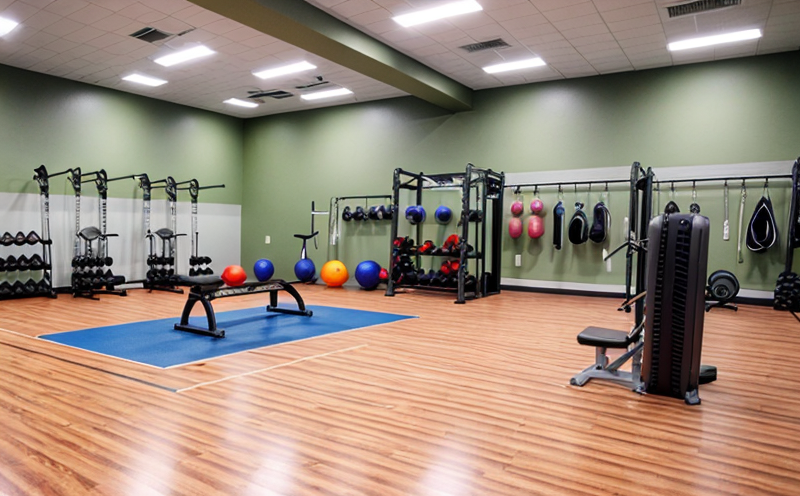Knot Slippage Resistance Testing in Ropes
The integrity and safety of sporting goods and fitness equipment are paramount. Knots used within ropes must withstand significant forces without slipping, ensuring that athletes and users can trust the equipment to perform as expected. Knot slippage resistance testing is a critical component of product safety and performance, especially for ropes in climbing gear, lanyards, and other high-stress applications.
During this test, we simulate real-world conditions by subjecting knots to tensile forces that mimic the loads they would encounter during use. The goal is to determine whether the knot will hold firm under these stresses or if it shows signs of loosening or slipping. This testing ensures that knots are not only strong but also reliable and consistent.
The process begins with careful selection and preparation of the rope material, which must be free from defects and adheres to international standards such as ISO 13960 for synthetic fibers. Once the ropes have been prepared, the knots are formed according to the specific design requirements. These can range from simple overhand knots to more complex designs like the figure-eight or bowline.
The testing apparatus consists of a series of calibrated pulleys and weights that apply controlled loads to the rope at various angles. The load is gradually increased until the knot begins to slip, allowing us to measure the maximum force before failure occurs. This data provides valuable insights into the knot's performance and durability.
Our team of experts uses advanced instrumentation and software to capture detailed measurements during each test run. These include not only the breaking strength but also the elongation rate and any deformation that occurs. The results are then compared against industry standards such as those set by ASTM F1892, which provides guidelines for static load tests on climbing ropes.
Understanding the behavior of knots under stress is essential for improving product design and ensuring user safety. By conducting thorough knot slippage resistance testing, manufacturers can identify potential weaknesses early in the development process and make necessary adjustments to enhance performance.
This service is particularly important for companies involved in the manufacturing of sporting goods like climbing ropes, lanyards, and harnesses. It helps them meet regulatory requirements and build a reputation for quality and reliability among consumers.
Moreover, testing knots ensures that products not only meet but exceed safety expectations. In an industry where accidents can have severe consequences, this level of scrutiny is crucial. By investing in knot slippage resistance testing, businesses demonstrate their commitment to creating safe and effective equipment.
Why It Matters
The importance of knot slippage resistance testing cannot be overstated. In the context of sporting goods and fitness equipment, knots play a vital role in ensuring that ropes remain secure under high loads. Any failure at this point could lead to serious accidents or injuries.
- Increased Safety: Ensures that users are not placed at risk due to potential knot failures.
- Regulatory Compliance: Helps manufacturers meet industry standards and avoid penalties for non-compliance.
- Enhanced Reputation: Builds trust with customers by demonstrating a commitment to safety and quality.
- Product Improvement: Identifies design flaws that could be addressed in future iterations of the product.
The consequences of poor knot slippage resistance testing can be dire. In extreme cases, it has led to fatalities during outdoor activities such as rock climbing and mountaineering. Therefore, investing in this service is not just a legal requirement but also a moral imperative for those involved in the production of sporting goods.
By conducting comprehensive knot slippage resistance testing, companies can ensure that their products are robust enough to handle the demands placed on them by users. This proactive approach helps prevent accidents and enhances overall product performance.
Eurolab Advantages
At Eurolab, our expertise in knot slippage resistance testing sets us apart from other laboratories. Our team of experienced professionals employs state-of-the-art equipment and follows rigorous protocols to ensure accurate and reliable results.
- Accurate Results: Using precise instrumentation, we provide data that is trusted by leading manufacturers.
- Comprehensive Expertise: Our experts have extensive experience in various testing methods and can offer valuable insights into improving product design.
- Regulatory Compliance: We stay up-to-date with the latest standards and regulations, ensuring that your products meet all necessary requirements.
- Efficient Service: With streamlined processes and dedicated resources, we deliver timely results to keep your projects on schedule.
Trust Eurolab for comprehensive knot slippage resistance testing. We are committed to helping you create products that are not only safe but also trusted by the market.





